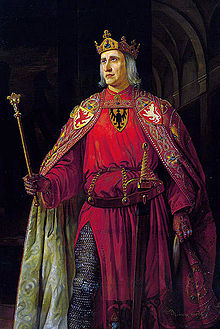Rudolf I, Holy Roman Emperor
| Rudolf I | |
|---|---|

Rudolf I of Habsburg by Ludwig Minnigerode
|
|
|
King of Germany (formally King of the Romans) |
|
| Reign | 29 September 1273 – 15 July 1291 |
| Coronation | 24 October 1273 Aachen Cathedral |
| Predecessor | (Richard of Cornwall) Interregnum |
| Successor | Adolf of Nassau |
| Duke of Carinthia | |
| Reign | 1276 – 1 February 1286 |
| Predecessor | Ottokar II of Bohemia |
| Successor | Meinhard II of Gorizia-Tyrol |
| Duke of Austria and Styria | |
| Reign | 26 August 1278 – 27 December 1282 |
| Predecessor | Ottokar II of Bohemia |
| Successor | Albert I |
| Born |
1 May 1218 Limburgh Castle near Sasbach am Kaiserstuhl |
| Died | 15 July 1291 (aged 73) Speyer |
| Burial | Speyer Cathedral |
| Spouse |
Gertrude of Hohenburg Isabella of Burgundy |
| Issue more... |
Albert I of Germany Rudolf II, Duke of Austria Matilda, Duchess of Bavaria Catherine, Duchess of Bavaria Agnes, Duchess of Saxony Hedwig, Mangravine of Brandenburg Clementia, Queen of Hungary Judith, Queen of Bohemia |
| House | House of Habsburg |
| Father | Albert IV, Count of Habsburg |
| Mother | Hedwig of Kyburg |
Rudolf I, also known as Rudolf of Habsburg (German: Rudolf von Habsburg, Czech: Rudolf Habsburský), 1 May 1218 – 15 July 1291, was Count of Habsburg from about 1240 and the elected King of the Romans from 1273 until his death.
Rudolf's election marked the end of the Great Interregnum in the Holy Roman Empire after the death of the Hohenstaufen emperor Frederick II in 1250. Originally a Swabian count, he was the first Habsburg to acquire the duchies of Austria and Styria in opposition to his mighty rival, the Přemyslid king Ottokar II of Bohemia, whom he defeated in the 1278 Battle on the Marchfeld. The territories remained under Habsburg rule for more than 600 years, forming the core of the Habsburg Monarchy and the present-day country of Austria.
Rudolf was the first king of the Romans of the Habsburg dynasty, and he played a vital role in raising the comital house to the rank of Imperial princes. He was also the first of a number of late medieval count-kings, so called by the historian Bernd Schneidmüller, from the rival noble houses of Habsburg, Luxembourg, and Wittelsbach, all striving after the Roman-German royal dignity, which ultimately was taken over by the Habsburgs in 1438.
...
Wikipedia
